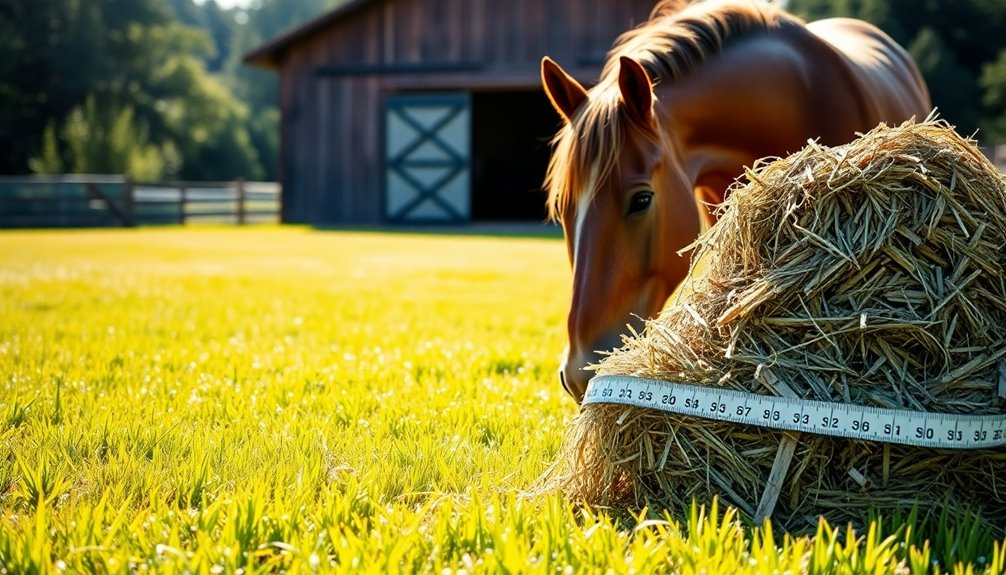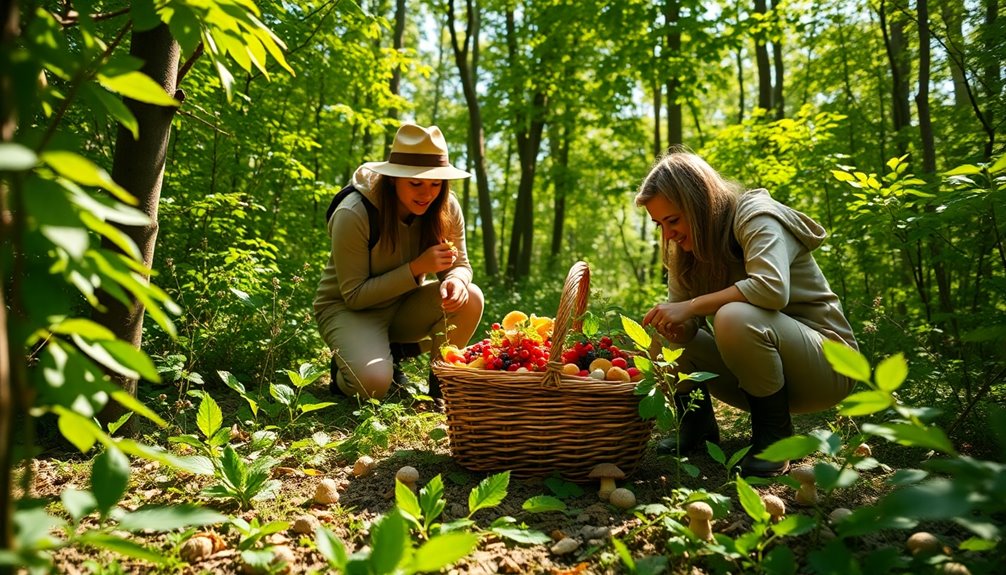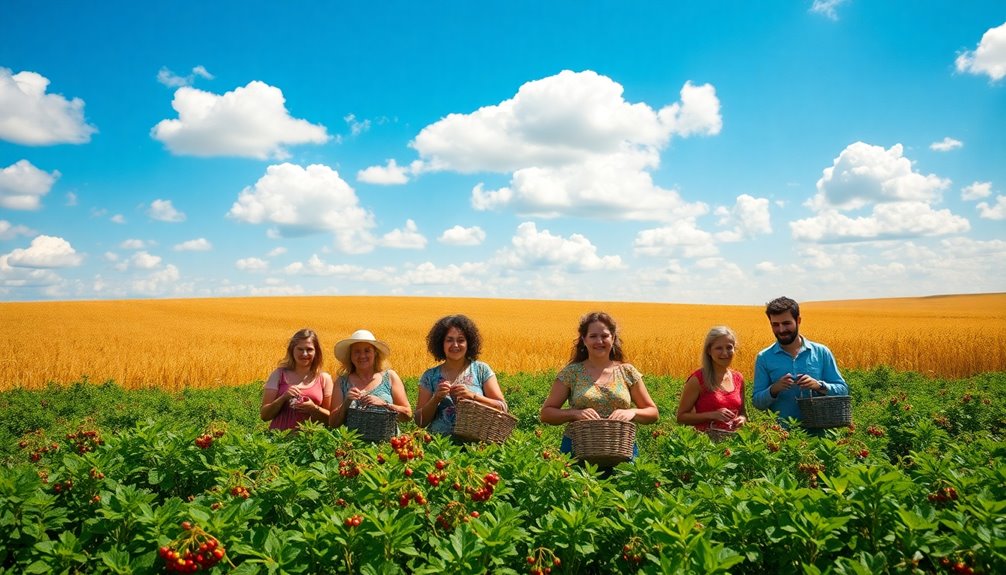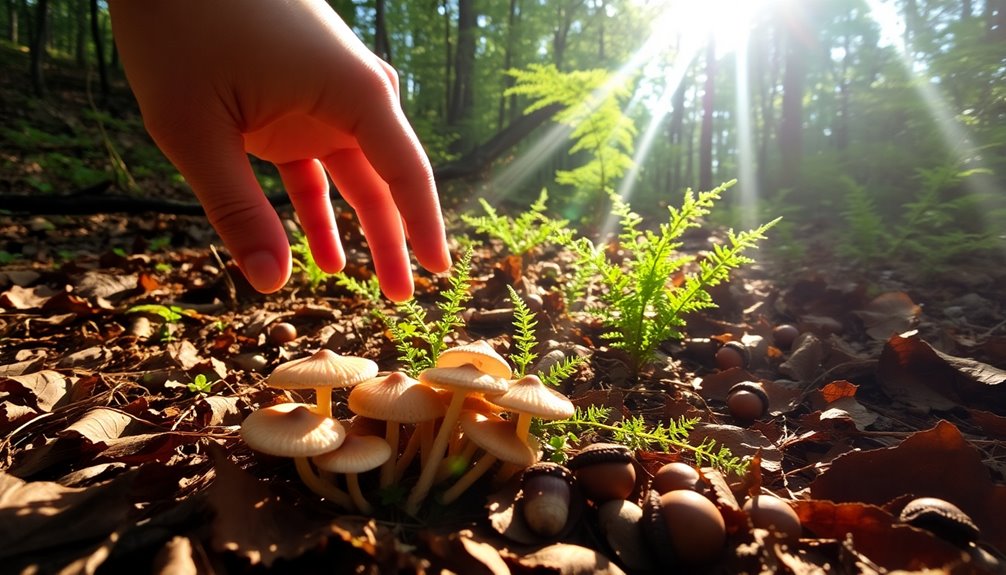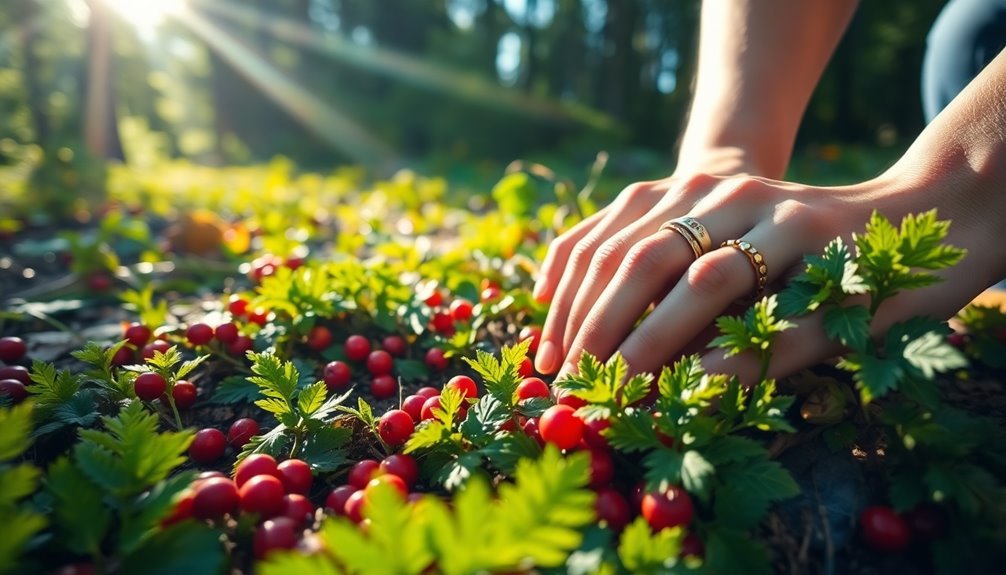Horses typically need between 1.5% and 2% of their body weight in forage each day. For an average 1,000-pound horse, that's about 16 to 32 pounds of forage daily! If you're letting your horse graze, it might consume only around 10 pounds since it's likely eating at a rate of 1% of its weight. Keep an eye on your pasture conditions, as they can affect forage availability and quality. Proper feeding management is vital for your horse's health. Curious about how to provide the best forage options? Stick around to uncover more essential tips!
Key Takeaways
- Healthy mature horses require 1.5-2% of their body weight in forage daily, equating to 16-32 pounds for an average 1,000-pound horse.
- Horses grazing continuously consume about 1% of their body weight, approximately 10 pounds, within 24 hours.
- Low-quality or overgrazed pastures necessitate providing supplemental hay to maintain horse health and body condition.
- Forage must provide adequate fiber; without it, nutritional deficiencies can occur, necessitating supplements for vitamins and minerals.
- Access to quality forage is crucial for promoting digestive health and overall well-being in horses.
Forage Consumption Guidelines
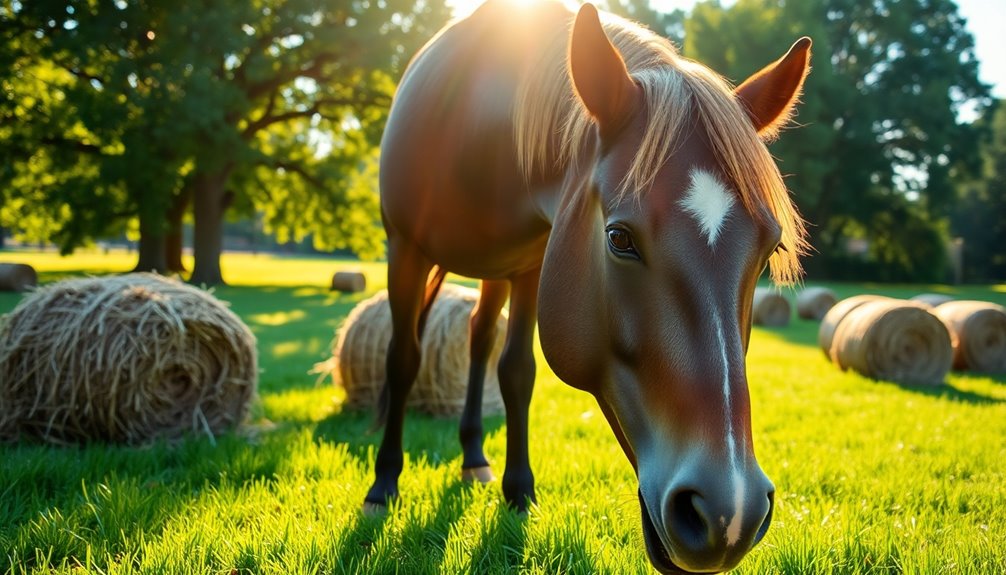
When it comes to your horse's forage consumption needs, understanding the right intake is fundamental for their health.
Healthy mature horses generally require daily forage intake of 1.5-2% of their body weight. For an average 1,000-pound horse, that translates to about 16-32 pounds (7-15 kg) of forage.
If your horse spends 24 hours grazing on pasture, it typically consumes about 1% of its body weight, or around 10 pounds (4.5 kg) during limited turnout.
It's important to keep an eye on your horse's body condition scoring, as they might need supplemental hay to maintain a healthy weight, especially during times of low forage availability.
Overgrazed or drought-stricken pastures can fall short in providing necessary calories, making quality hay, haylage, or cubes a significant part of their diet.
Impact of Pasture Conditions
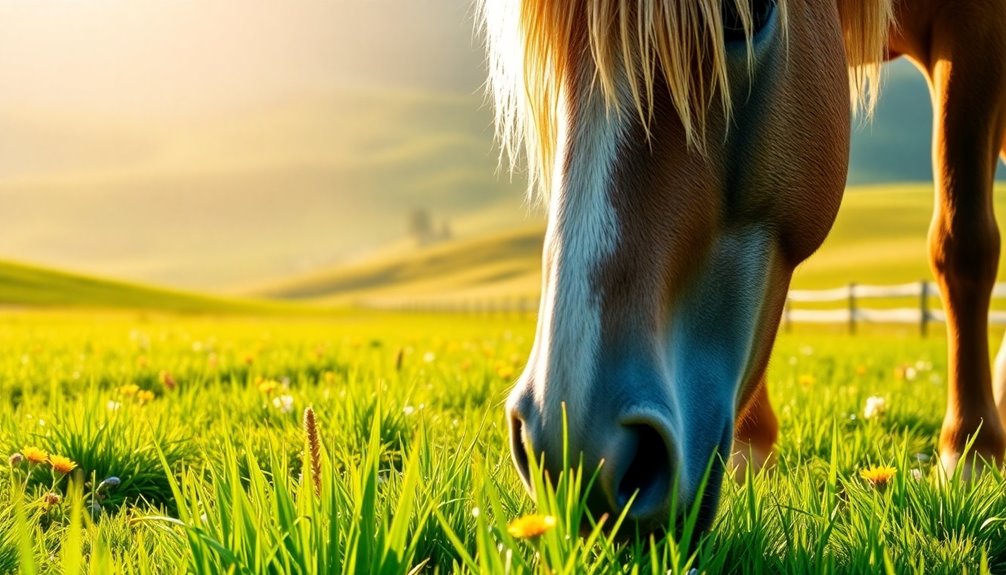
Pasture conditions play an important role in your horse's overall health and nutrition. If you have overgrazed or drought-stricken pastures, they may not provide the adequate calories your horse needs. This could lead to a potential need for supplemental forage to maintain a healthy weight and improve your horse's body condition score.
During fall and winter, pastures often don't grow, so you should feed your horse as if no pasture is available.
If you're dealing with low-quality pastures, it's vital to make a daily offering of proper hay, haylage, or cubes to guarantee your horse gets the forage it needs. Good-quality round bales mightn't work for all horses, especially those with respiratory issues, as this can affect their forage intake.
Regularly monitoring pasture conditions is significant. Limited grazing opportunities can impact how much forage your horse consumes and may require you to adjust their diet accordingly.
Nutritional Requirements and Supplements
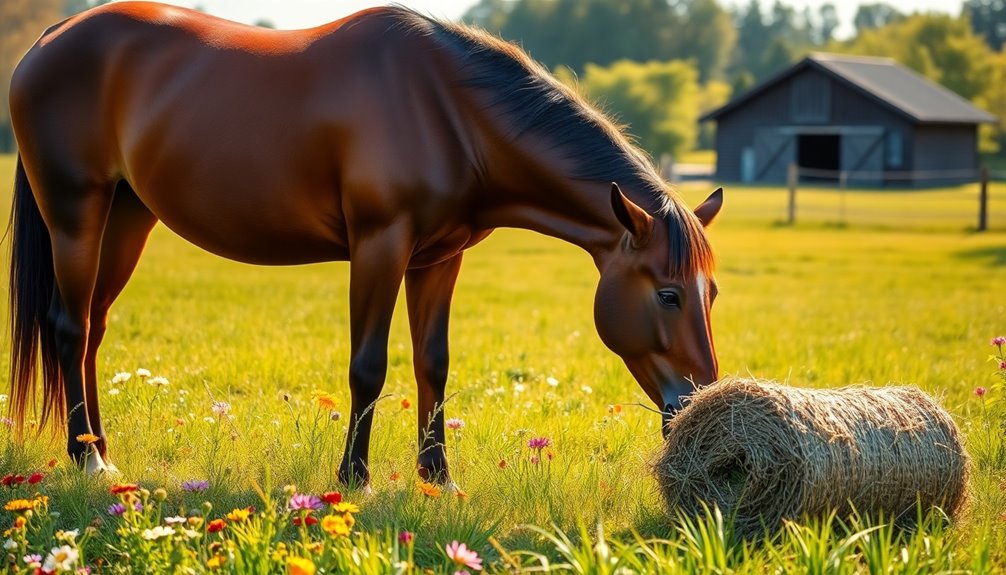
Understanding your horse's nutritional requirements is critical for maintaining their health and performance. Horses typically need 1.5-2% of their body weight in forage daily, which translates to about 16-32 pounds for a 1,000-pound horse. Meeting these forage needs is essential to guarantee your horse receives adequate fiber, which aids digestion and overall well-being.
In addition to forage, you might need to take into account supplemental energy, especially if your horse struggles with body condition or faces increased energy demands, like during colder weather. Access to fresh, unfrozen water is also important for hydration, as dehydration can lead to serious health issues.
Don't forget about minerals and vitamins! Hay alone may not provide all the necessary nutrients, so you may need to add supplements to fill any gaps in your horse's diet.
Always verify that salt, either loose or in block form, is available to support electrolyte balance and overall health.
Grazing Behavior Insights
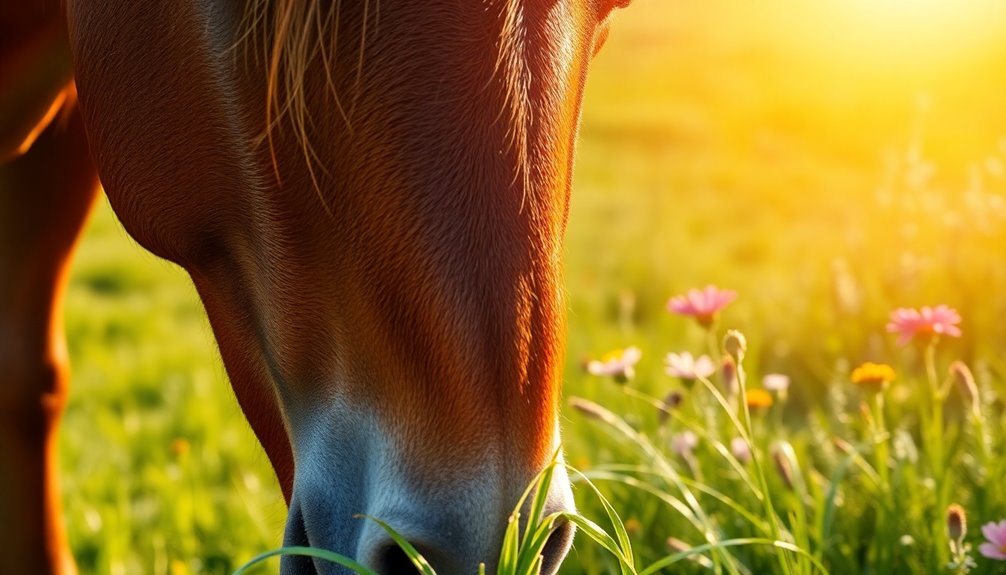
Observing your horse's grazing behavior offers valuable insights into their nutritional intake and overall health. Horses typically consume 1-2 pounds of pasture dry matter per hour, which means their daily intake can vary considerably depending on how long they graze and the quality of the pasture.
When your horse has continuous access to pasture, they can graze for about 16 hours a day, effectively meeting their dry matter intake needs.
However, if you limit their pasture access to half-day turnouts, they may only consume around 1% of their body weight, making diligent feeding management essential. This limited intake can lead to nutritional deficiencies if not addressed.
Factors like pasture conditions, horse activity levels, and forage availability notably influence their grazing behavior.
Recent Research Findings
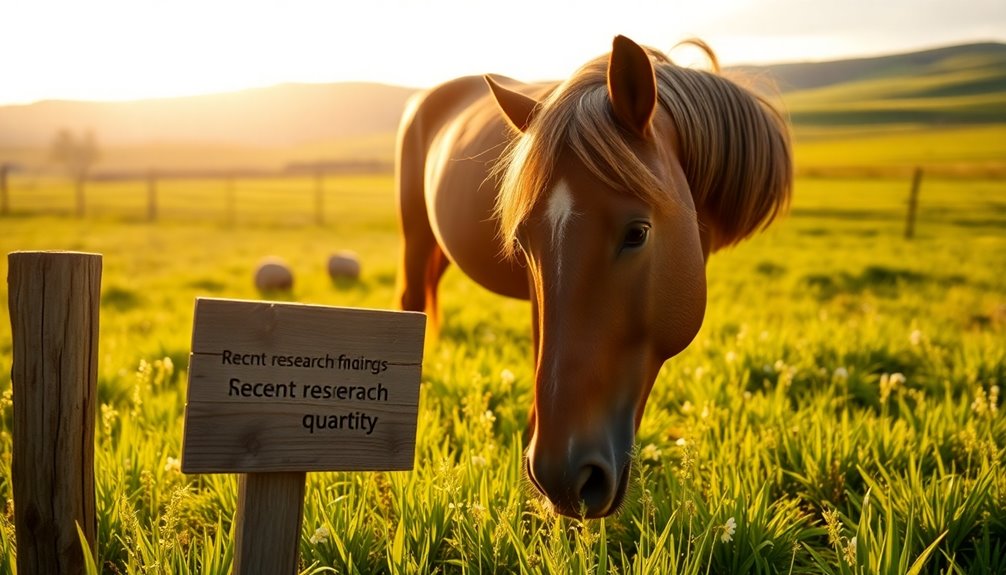
In recent years, research has shed light on vital aspects of equine health and nutrition that can directly impact your horse's well-being. Here are some key findings:
- The microbiota-gut-brain axis is essential in understanding behaviors like cribbing in horses.
- Platelet-rich plasma (PRP) shows promise for its anti-inflammatory properties, potentially benefiting equine health.
- Various herbs are being studied as natural dewormers, offering alternatives to conventional treatments.
- Restricted grazing can markedly affect horse behavior and overall well-being, highlighting the importance of adequate forage access.
These insights emphasize how fundamental it's for your horse to receive the right amount of forage daily.
Horses need to eat a diet rich in fiber to maintain their digestive health and emotional stability. Current research continues to promote ideal dietary support, ensuring that your horse thrives.
When we prioritize sufficient forage and understand the implications of restricted grazing, we set our horses up for healthier, happier lives.
Keep these findings in mind as you evaluate your horse's diet and overall care strategy. Your horse relies on you to provide the nutrition they need to flourish.
Frequently Asked Questions
How Much Forage Should a Horse Get per Day?
When considering how much forage your horse should get daily, aim for about 1.5-2% of their body weight.
For a 1,000-pound horse, that's roughly 15-30 pounds.
If your horse spends most of its time on pasture, it might consume forage for about 16 hours a day.
Keep an eye on their grazing behavior, activity level, and body condition to guarantee they're getting the right amount of quality forage for peak health.
What Is the Forage Requirement for a Horse?
Imagine your horse as a garden, blooming with health. To thrive, it needs about 1.5-2% of its body weight in daily forage. For a 1,000-pound horse, that's roughly 15-30 pounds.
If your pasture's looking sparse, think of it as a drought-stricken patch; you'll need to supplement with hay.
Keep a close eye on its forage intake to prevent health issues. A well-fed horse blossoms just like a garden in full bloom!
What Is the Bare Minimum Amount of Dry Forage a Horse Needs per Day as a Percentage of Their Body Weight?
Horses need at least 1.5% of their body weight in dry forage daily. For a 1,000-pound horse, that's about 15 pounds. This minimum amount helps maintain their health and supports proper digestion.
If your horse weighs more, you'll need to adjust accordingly, potentially providing up to 20 pounds or more. Always keep an eye on their body condition and adjust forage intake as needed, especially during seasonal changes or when pastures are limited.
How Many Hours a Day Should a Horse Graze?
You might think your horse only needs a few hours of grazing, but that's far from the truth.
Ideally, your horse should graze for about 16 hours a day if they're on pasture. Continuous grazing allows them to consume necessary nutrients, keeping them healthy and satisfied.
Limiting their grazing time can lead to nutritional deficiencies and behavioral issues.
Conclusion
In the grand tapestry of equine health, forage is the vibrant thread that weaves vigor into your horse's life. By understanding their daily needs, you guarantee they flourish like a wildflower in spring. Whether it's lush pasture or quality hay, keeping an eye on your horse's forage intake is crucial. With the right balance, you'll watch your horse thrive, dancing through the fields with the grace of a gentle breeze, full of energy and life.

